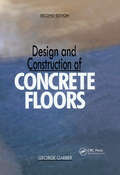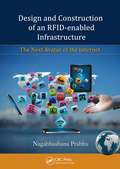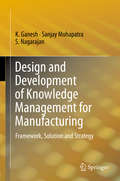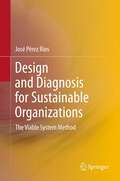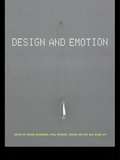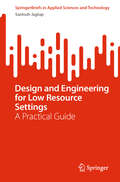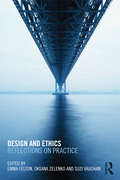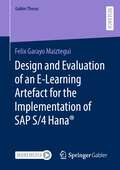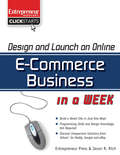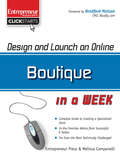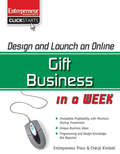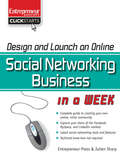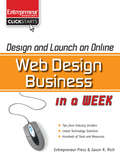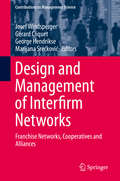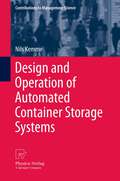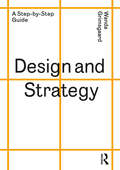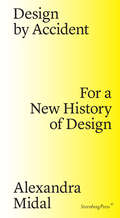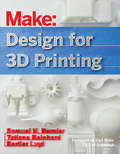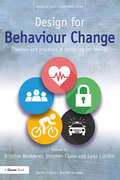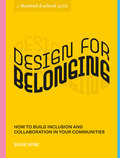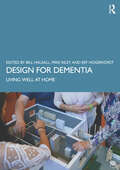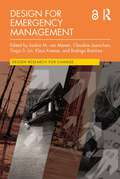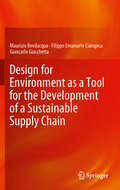- Table View
- List View
Design and Construction of Concrete Floors
by George GarberDesign and Construction of Concrete Floors outlines the key principles needed for the production of a good floor which can be relied on to not only support and restrain other parts of the building, but also to meet the needs of the user.The book covers:* Uses of concrete floors* Structural design* Concrete used specifically for floors* Cracks and joints* Floor surface propertiesThis book is ideal for structural engineers and others in the building and design industry that want to use a balanced approach and look beyond structural strength in the design of a good floor.The book draws on both European and American experience, citing both British and US standards – all of which have been amended and updated since the last edition.
Design and Construction of an RFID-enabled Infrastructure: The Next Avatar of the Internet
by Nagabhushana PrabhuInternet 2.0 (previously called the Internet of Things) presents a tantalizing vision of bridging the cyber and physical worlds to forge a seamless planet-wide infrastructure in which cyber resources and physical objects can interact without human intervention. The technology needed to build the infrastructure already exists. However, more than a d
Design and Development of Knowledge Management for Manufacturing
by Sanjay Mohapatra K. Ganesh S. NagarajanThis book examines the modules/elements required before implementing knowledge management solutions in typical manufacturing and service industry. The objective is to develop a framework, design and model suitable for all requirements and a strategy to properly implement. Related case studies from organizations are included, with the results provided to use as a solution to problems experienced when implementing knowledge management in the industry. Implementing a knowledge management system can be complex and dynamic, no matter how well planned and developed. Inevitably a degree of organizational inertia is focused on the current state rather than the new. Within an enterprise, personal and group involvement and interests process status and technology landscape can deflect the commitment needed to successfully implement such a system. Cumulative evidence from past research in knowledge management suggests that effective implementation of KM solution in any organization requires a robust designs and models for various critical elements of process, people and technology. Using the techniques provided in this book, readers should be able to design knowledge management strategies, to align objectives of the KM initiatives with their business goals.
Design and Diagnosis for Sustainable Organizations: The Viable System Method
by Perez Rios JoseHow can organizations and their managers face the tremendous complexity of the current environment? How can their compliance with the requirements of sustainability be evaluated? And how can new organizations be structured to ensure their viability? This book addresses these questions in a very practical way, essentially combining systems theory with cybernetics to help managers to evaluate and shape organizations by making accessible the wealth of knowledge contained in these fields. Importantly, it also provides guidelines for its practical application.
Design and Emotion
by Paul Hekkert Deana McDonagh Diane Gyi Jeroen Van ErpThere is considerable interest in and growing recognition of the emotional domain in product development. The relationship between the user and the product is paramount in industry, which has led to major research investments in this area. Traditional ergonomic approaches to design have concentrated on the user's physical and cognitive abil
Design and Engineering for Low Resource Settings: A Practical Guide (SpringerBriefs in Applied Sciences and Technology)
by Santosh JagtapThis book provides an integrated and practical methodology aimed at designing, developing, and implementing holistic solutions for the betterment of people living in low resource settings within developing nations. These people confront a multitude of challenges at individual, institutional, economic, and technological levels. Consequently, integrated solutions are necessary to satisfy their unmet or underserved needs effectively. Using a comprehensive approach, this book offers a systematic methodology for designing such integrated solutions, supplemented by case studies and actionable guidelines. Outstanding features of the book include: An integrated methodology and guidelines for designing, developing, and implementing holistic solutions to support development of resource-constrained societies. The guidelines cover phases in the design process such as understanding context and needs, concept exploration and detailing, and implementation. Case studies illustrate each guideline. Visual illustrations for easy understanding of the guidelines. Actionable methods and strategies for applying the integrated methodology and guidelines in projects. Practitioners, students, and researchers, interested in the sustainable development of low resource settings, will find this book motivating and practical.
Design and Ethics: Reflections on Practice
by Emma Felton Oksana Zelenko Suzi VaughanThe value of design for contributing to environmental solutions and a sustainable future is increasingly recognised. It spans many spheres of everyday life, and the ethical dimension of design practice that considers environmental, social and economic sustainability is compelling. Approaches to design recognise design as a practice that can transform human experience and understanding, expanding its role beyond stylistic enhancement. The traditional roles of design, designer and designed object are therefore redefined through new understanding of the relationship between the material and immaterial aspects of design where the design product and the design process are embodiments of ideas, values and beliefs. This multi-disciplinary approach considers how to create design which is at once aesthetically pleasing and also ethically considered, with contributions from fields as diverse as architecture, fashion, urban design and philosophy. The authors also address how to teach design based subjects while instilling a desire in the student to develop ethical work practices, both inside and outside the studio.
Design and Evaluation of an E-Learning Artefact for the Implementation of SAP S/4HANA® (Gabler Theses)
by Felix Garayo MaizteguiThe objective of this study is to create a new e-learning artefact for SAP S/4 Hana training purposes. Based on Design Science Research, a new prototype of an e-learning artefact has been developed. The prototype is grounded on didactic and information systems theories, as well as models. The aim of this new prototype is to transfer knowledge of business processes with the new Enterprise Resource Planning (ERP) SAP S/4 HANA in an effective and efficient way. The study is validated through an experiment with a treatment and a control group. While the treatment group learns with the new e-learning artefact, the control group keeps with the existing conventional training. Results show that the treatment group have significantly less dropouts than the control group, and that the treatment group could also finalize the SAP S/4 Hana exercises in less time. This study shows also how companies can benefit significantly using the same approach through a set of guidelines.
Design and Launch an E-Commerce Business in a Week
by Jason R. RichHave you fantasized about your own retail store-selling your own specialty items, showcasing unique products or better promoting existing products? Or have you dreamed of working from home, setting your own hours and still making great money? Today's technology makes it easier than ever to take your retail dreams to the world's largest marketplace-the Internet. In just days, you can build your own eCommerce website, reach potential customers by the millions, process orders 24/7 and accept payments from all over the world-with no technical background or graphic design skills! Design a professional eCommerce site using inexpensive, turnkey solutions from established companies like Google, Yahoo! and Go Daddy that require no programming or graphic design knowledge Create content and online deals that capture shoppers and keep them coming back Use surefire online tools that work 24/7 to handle payments and accept orders Drive traffic using Search Engine Optimization and other marketing and advertising techniques Skillfully handle inventory, order fulfillment, customer service and all other operations The world's largest marketplace is at your fingertips...take advantage of it!
Design and Launch an Online Boutique in a Week
by Melissa CampanelliWouldn't you love to own your own trendy boutique-a hot spot that showcases your unique style? Do you daydream about selling your signature products to high-end shoppers? Your dream is just a few clicks and one week away! Whether your taste is classy and elegant or hip and unique, there's a spot for you in today's largest retail center-the internet. In just days, build your posh, online boutique selling luxury, designer goods or your own upscale, signature products. Learn how to handle and showcase inventory, reach affluent shoppers, fulfill orders, accept payments and so much more-using turnkey solutions that require no technical skills! Design a professional specialty-retail site using inexpensive, turnkey solutions from established companies like Google, Yahoo! and Go Daddy that require no programming or graphic design knowledge Create eye-catching content that captures elite shoppers and keeps them coming back. Use foolproof online tools that work 24/7 to handle payments and accept orders. Drive traffic using search engine optimization, new media marketing and other marketing and advertising techniques. Skillfully handle inventory, order fulfillment, customer service and all other operations. Stylish, unique, one-of-kind-turn your personal taste into a successful, online store--in just a few clicks and a few days!
Design and Launch an Online Gift Business in a Week
by Cheryl KimballAre you creative? Interested in taking your favorite hobby or inventive attitude to a new, more profitable level? Would you like to work from the comfort home, making money around the clock? Thanks to today's turnkey technology, in just a few clicks and a few days you can build a virtual gift store selling your favorite items to millions! Choose from today's hottest online gift businesses, including food, pets, hobbies, home goods, and holiday items, or debut and sell your signature goodies. In just one week, break into the billion-dollar gift industry, create a fully-functioning website, tap into millions of eager online shoppers, and more! Design an attractive, multi-functional website using inexpensive, turnkey solutions that require no programming knowledge Tap into the newest gift trends, and choose your specialty and services Use easy, automated solutions that work 24/7 to accept orders and handle payments Skillfully manage inventory, order fulfillment, customer service, and all other operations Create repeat shoppers with online deals and promotions Drive traffic using search engine optimization, social marketing, and other online marketing techniques
Design and Launch an Online Social Networking Business in a Week
by Julien SharpAre you a virtual social butterfly? Captivated by the buzz of new media? Interested in setting the online social scene for others? And making a profit doing so? Tap into the millions of MySpace users and Facebook friends to create your own specialized social site! In just seven days, identify your network niche; develop an inviting, interactive website; drive traffic and membership; build profitable online advertising relationships; and more! Design an attractive, interactive social networking website using inexpensive, turnkey solutions that require no programming knowledge Define your community and set the tone Offer interactive features including profile pages, member search options, media add-ons, and more Generate traffic and membership using search engine optimization, viral and social marketing, and other techniques Cash in on your site with proven, revenue-generating solutions Use included resources to stay on the cutting-edge
Design and Launch an Online Travel Business in a Week
by Charlene DavisLove travel? Do you enjoy discovering new adventures, finding the best deals, and making plans? Would you like to work with people around the world from the comfort of home? In the trillion-dollar, worldwide travel and tourism industry, it's easier than ever to tap into your enthusiasm for travel and turn it into your next paycheck. In just one week, discover how to establish your business, create an attractive and functional website, master online marketing tools, partner with qualified providers, and more! Design an attractive, multi-functional website using inexpensive, turnkey solutions that require no programming knowledge Tap into the newest travel trends, and choose your specialty and services Set policies and procedures that satisfy your and your clients' needs Use easy, automated solutions that work 24/7 to handle requests and payments Drive traffic using search engine optimization, social marketing, and other online marketing techniques Boost profits by expanding your offerings
Design and Launch an Online Web Design Business in a Week
by Jason R. RichAre you an online artist ready to take your passion to the next level? Would you love your creative talent to be on showcase for millions to see and buy? Thanks to today's amazing technology, it's easier than ever to tap into your passion and turn it into your next paycheck! In just a few days and a few clicks, you can build a successful online web design business selling your creative services. Discover how to easily develop your own website, effectively showcase your work, promote yourself to a worldwide audience, generate new clients, better service existing clients, and more! Design an attractive, business website using inexpensive, turnkey solutions from established companies like Google, Yahoo! and Go Daddy that require no programming knowledge Create a killer online portfolio that captures new clients Use easy online tools that work 24/7 to handle requests and payments Drive traffic using search engine optimization and other marketing and advertising techniques Boost profits by expanding your specialty or your business
Design and Management of Interfirm Networks: Franchise Networks, Cooperatives and Alliances (Contributions to Management Science)
by Gérard Cliquet George Hendrikse Josef Windsperger Marijana SrećkovićInterfirm networks include franchising, retail and service chains, cooperatives, financial networks, joint ventures, strategic alliances, licensing, public-private partnerships and new network forms in the digital economy. This book gathers the latest research studies that approach these networks – and the creation of innovation under the conditions of a complex, dynamic, knowledge-intensive and digital economy – from an interdisciplinary perspective. The studies, all of which were written by respected experts, explore how firms can improve their competitiveness by securing access to innovation, knowledge, complementary resources and capabilities otherwise not available to them. In addition, they highlight how, driven by an unpredictable environment, firms embedded in inter-organizational networks are increasingly transforming from co-operators to collaborators and valuable co-creators of innovation.
Design and Meanings: Innovating by Making Sense of Things--The Advantage of Design-Driven Innovation
by Roberto VergantiEvery product has a meaning. Yet many companies do not think about how meanings change or how to innovate meanings. They strive to understand how people currently give meaning to things--only to discover that this meaning has been suggested by a new product designed by a competitor. But like technologies, meanings may be subject to an R&D process. And the process through which a company can innovate product meanings is design. This chapter illustrates the profound link between meanings, innovation, and design, guiding you through well-developed notions of design theory; emphasizing the ways in which design differs from other innovation processes; and revealing why design is so important to creating competitive advantage. This chapter was originally published as chapter 2 of "Design-Driven Innovation: Changing the Rules of Competition by Radically Innovating What Things Mean."
Design and Operation of Automated Container Storage Systems
by Nils KemmeThe storage yard is the operational and geographical centre of most seaport container terminals. Therefore, it is of particular importance for the whole terminal system and plays a major role for trade and transport flows. One of the latest trends in container-storage operations is the automated Rail-Mounted-Gantry-Crane system, which offers dense stacking, and offers low labour costs. This book investigates whether the operational performance of container terminals is influenced by the design of these storage systems and to what extent the performance is affected by the terminal's framework conditions, and discusses the strategies applied for container stacking and crane scheduling. A detailed simulation model is presented to compare the performance effects of alternative storage designs, innovative planning strategies, and other influencing factors. The results have useful implications future research, practical terminal planning and optimisation.
Design and Strategy: A Step-by-Step Guide
by Wanda GrimsgaardThis major practical handbook bridges the gap between strategy and design, presenting a step-by-step design process with a strategic approach and extensive methods for innovation, strategy development, design methodology and problem solving. It is an effective guide to planning and implementing design projects to ensure strategic anchoring of the process and outcome. Built around a six-part phase structure that represents the design process, covering initial preparations and project briefing, research and analysis, targets and strategy, concept development, prototyping and modelling, production and delivery, it is a must-have resource for professionals and students. Readers can easily dip in and out of sections, using the phase structure as a navigation tool. Unlike other books on the market, Design and Strategy addresses the design process from the perspective of both the company and the designer. For businesses, it highlights the value of design as a strategic tool for positioning, competition and innovation. For the designer, it teaches how to create solutions that are strategically anchored and deliver successful outcomes for businesses, resulting in appreciative clients. It includes over 250 illustrations and diagrams, tables, and text boxes showing how to move through each stage with clear visualisation and explanation. This book encourages all designers in product design and manufacturing, service design, communication design, branding, and advertising, to think beyond shape and colour to see design through the lens of strategy, process and problem solving, and all business managers, innovators and developers, to see the value in strategic design outcomes.
Design by Accident: For a New History of Design
by Alexandra MidalA counterhistory and new historiography of design.In Design by Accident, Alexandra Midal declares the autonomy of design, in and on its own terms. This meticulously researched work proposes not only a counterhistory but a new historiography of design, shedding light on overlooked historical landmarks and figures while reevaluating the legacies of design's established luminaries from the nineteenth century to the present. Midal rejects both linear narratives of progress and the long-held perception of design as a footnote to the histories of fine art and architecture. By weaving critical analysis of the canon of design history and theory together, with special attention to the writings of designers themselves, she draws out the nuances and radical potentials of the discipline—from William Morris's ambivalence toward industry, to Catharine Beecher's proto-feminist household appliances, to the Bauhaus's Expressionist origins, and the influence of Herbert Marcuse on Joe Colombo.
Design for 3D Printing: Scanning, Creating, Editing, Remixing, and Making in Three Dimensions
by Bertier Luyt Samuel N. Bernier Tatiana ReinhardFrance's Le FabShop has extensive experience testing 3D printers and creating digital models for them. From an articulated Makey Robot to a posable elephant model, Samuel N. Bernier and the rest of Le FabShop's team have created some of the most-printed designs in the 3D printing world. This book uses their work to teach you how to get professional results out of a desktop 3D printer without needing to be trained in design. Through a series of tutorials and case studies, this book gives you the techniques to turn a product idea into a 3D model and a prototype. Focusing on free design software and affordable technologies, the exercises in this book are the perfect boost to any beginner looking to start designing for 3D printing. Designing for the tool and finding a good tool to fit the design--these are at the core of the product designer's job, and these are the tools this book will help you master. Foreword by Carl Bass, Autodesk's CEO, a passionate and prolific Maker. In Design For 3D Printing, you'll:Learn the different 3D printing technologiesChoose the best desktop 3D printerDiscover free 3D modeling softwareBecome familiar with 3D scanning solutionsFind out how to go from a bad to a good 3D source file, one that's ready-to-print
Design for Behaviour Change: Theories and practices of designing for change (Design for Social Responsibility)
by Kristina Niedderer Stephen Clune Geke LuddenDesign impacts every part of our lives. The design of products and services influences the way we go about our daily activities and it is hard to imagine any activity in our daily lives that is not dependent on design in some capacity. Clothing, mobile phones, computers, cars, tools and kitchenware all enable and hold in place everyday practices. Despite design’s omnipresence, the understanding of how design may facilitate desirable behaviours is still fragmented, with limited frameworks and examples of how design can effect change in professional and public contexts. This text presents an overview of current approaches dedicated to understanding how design may be used intentionally to make changes to improve a range of problematic social and environmental issues. It offers a cross-disciplinary and cross-sectoral overview of different academic theories adopted and applied to design for behaviour change. The aim of the volume is twofold: firstly, to provide an overview of existing design models that integrate theories of change from differing scientific backgrounds; secondly, to offer an overview of application of key design for behaviour change approaches as used across case studies in different sectors, such as design for health and wellbeing, sustainability, safety, design against crime and social design. Design for Behaviour Change will appeal to designers, design students and practitioners of behavioural change.
Design for Belonging: How to Build Inclusion and Collaboration in Your Communities (Stanford d.school Library)
by Stanford d.school Susie WiseA practical, illustrated guide to using the tools of design to create feelings of inclusion, collaboration, and respect in groups of any type or size—a classroom, a work team, an international organization—from Stanford University's d.school.&“This is a beautiful book. Wise has applied the gift and imagination and lenses of the d.school to one of our most precious questions: how to create belonging.&”—Priya Parker, author of the Art of Gathering and host of the New York Times podcast Together ApartBelonging brings out the best in everyone. Whether you&’re a parent, teacher, community organizer, or leader of any sort, your group is unlikely to thrive if the individuals don&’t feel welcomed, included, and valued for who they are.The good news is that you can use design to create feelings of inclusion in your organization: rituals that bring people together, spaces that promote calm, roles that create a sense of responsibility, systems that make people feel respected, and more. You can&’t force feelings, but in Design for Belonging, author and educator Susie Wise explains how to use simple levers of design to set the stage for belonging to emerge. For example, add moveable furniture to a meeting space to customize for your group size; switch up the role of group leader regularly to increase visibility for everyone; or create a special ritual for people joining or leaving your organization to welcome fresh perspectives and honor work well done.Inspiration and stories from leaders and scholars are paired with frameworks, tools, and tips, providing an opportunity to try on different approaches. By the end of the book, you&’ll be able to spot where a greater sense of belonging is needed and actively shape your world to cultivate it—whether it&’s a party, a high-stakes meeting, or a new national organization.
Design for Dementia: Living Well at Home
by Eef Hogervorst Michael Riley Bill HalsallDesign for Dementia is written by an interdisciplinary team of professionals and academics whose aim is to present lessons learnt from the Dementia Demonstration House at the Building Research Establishment’s Innovation Park. Known as Chris and Sally’s House, the project represents a unique opportunity to show in practice what can be done to assist people living with dementia to continue to live at home and as part of the community with as much independence as possible. This book presents evidence based practical design guidance backed up by over 15 combined years of research by experienced professional designers.Beginning with an introduction which provides the background to the global dementia epidemic to allow readers to gain a better understanding of the issues they must consider, the book then discusses how good design principles, planning and construction standards can be used to effectively respond to the dementia crisis. The detailed findings from research using Chris and Sally’s House are presented and discussed, along with practical examples and success stories ranging from simple design features to the more complex use of sensors and automated ventilation.The hope is that readers can apply the lessons learnt from Chris and Sally’s House to successfully integrate solutions into the design of new or refurbished housing for the elderly and also that the tools and insights shared will inform the wider context of good housing design, as well as the spectrum of constraints and design standards which often apply. This book is important reading for architects, designers, engineers and project managers, but also anyone with an interest in learning about practical solutions to aid those with dementia to live well at home.
Design for Emergency Management (Design Research for Change)
by Rodrigo Ramírez Claudine Jaenichen Tingyi S. Lin Klaus Kremer Saskia M. van ManenThrough a combination of theory, practice, and a range of interdisciplinary case studies, this book expands how we define and think about the critical role and relationship between design and emergencies. This role extends far beyond aesthetics: the book highlights the urgency of ensuring that a wide range of stakeholders and a diverse representation of the public comes together to work towards preventing disasters. Design in the context of disasters, such as earthquakes, hurricanes, flooding and (wild) fires, provides new ways of looking at challenges. It contributes methods to actively engage communities in managing and minimizing disaster risk. Contributors present the latest research on how (collaborative) design and design thinking contribute to the development of processes and solutions to increase disaster literacy and decrease disaster risk for individuals and entire communities. Chapters highlight applied research and implementation of design and design thinking before, during, and after emergencies, resulting in a set of design guidelines derived from best practice. The book will be of interest to scholars and practitioners in emergency management, product and service design, strategic design, design research, co-design, social design, design for change, and human-centered design.
Design for Environment as a Tool for the Development of a Sustainable Supply Chain
by Maurizio Bevilacqua Filippo Emanuele Ciarapica Giancarlo GiacchettaEnvironmental Design is becoming an increasingly significant agenda for many manufacturing companies and yet there is no standard to their approaches, strategies or their levels of execution. Applying Design for Environment (DfE) methodologies to develop a more sustainable supply chain has formed procedures and techniques which allow designers to integrate these methods with environmental supply chain management. Design for Environment as a Tool for the Development of a Sustainable Supply Chain aims to define relevant target specifications for a product throughout its life cycle; from conception and design to the end of its operating life. Be considering this new approach to the supply chain, environmental responsiveness can work in tandem with sounds business management. The usual focus on suppliers, manufacturers and customers is expanded in Design for Environment as a Tool for the Development of a Sustainable Supply Chain to include stakeholders such as government bodies and recycling companies. The influence of these additional groups is analyzed alongside concepts such as: Product life cycle development aimed at environmental impact minimization; Supplier selection and management based on environmental criteria; and Marketing and communication choices which increase the value of environmentally sensitive products. By including several case studies alongside theoretical topics, Design for Environment as a Tool for the Development of a Sustainable Supply Chains acts as a foundation for professionals across the supply chain, from industrial designers to marketing and sales departments, who are involved in environmental issues.
